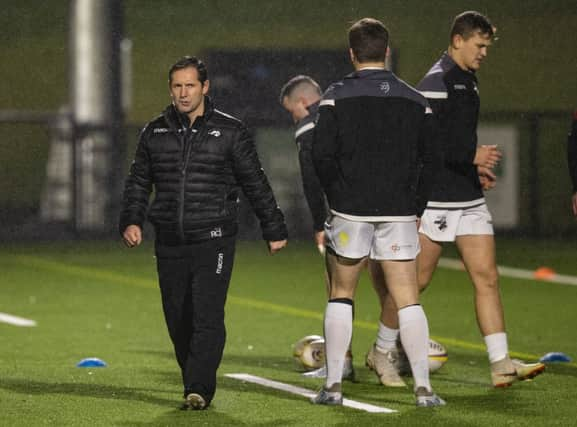Southern Knights coach Rob Chrystie saddened by Greenyards vandalism


As well as the sevens game, the Greenyards has been the breeding ground for some of the great names in Scottish rugby, from Jim Telfer and Keith Robertson through to the late 1980s-90s generation of Craig Chalmers, Bryan Redpath and Doddie Weir.
The celebrated annual sevens tournament is to be expanded into a four-day festival this year with the ultimate goal of hosting the 2033 Sevens World Cup, 150 years after local butcher Ned Haig invented the abbreviated game.
Advertisement
Hide AdAdvertisement
Hide AdAmbition has never been something lacking in Melrose but sometimes progress puts noses out of joint and their rebranding as the Southern Knights for the fledgling part-time professional FOSROC Super 6, and subsequent replacement of the sacred Greenyards turf with an artificial pitch over the summer, has torn the town in two.
As the Knights, following no wins out of five games so far, prepared for tonight’s Super 6 match against Boroughmuir Bears at Meggetland, police were called in this week after the changing rooms of the new franchise were vandalised.
Last weekend, logos and signage for the new club were defaced with spray paint.
Southern Knights head coach Rob Chrystie said: “I’m quite sad if I’m being honest, that someone feels they need to come in and spray paint, vandalise something that really we’ve put a lot of work into. Pretty insulting really to the playing group that created it as well. So, pretty sad and pretty disappointed.”
The Southern Knights concept was certainly the most radical of the Super 6 rebrandings following the winning bids from Melrose, Heriot’s, Watsonians, Ayr (now Ayrshire Bulls), Boroughmuir (Bears) and Stirling County.
The plan was to create a franchise that could draw in support from across Scottish rugby’s rivalry-ridden Borders heartlands. When that was tried with the Reivers pro-team it failed to unite the region and was disbanded after five years in 2007.
This time, the Southern Knights project seems to have not only failed to unite a region but instead divided a town.
The SRU remains positive, however, as the rescheduled Bears v Knights clash completes the first six rounds of the inaugural Super 6.
Advertisement
Hide AdAdvertisement
Hide AdTournament chief Sean Lineen, the former Scotland centre and current Under-20s coach, said: “The Super 6 came about because of the need for our players and coaches to be tested at a level that was sort of in the middle of the Premiership and pro rugby.
“What I’ve found having worked with the Under-20s was that opportunities exist for them outside Scotland so we needed to have an opportunity that would excite and challenge them.
“I’ve been really impressed with the support on and off the field. There’s still a lot of work to do. We know it’s not the perfect vehicle at the moment but we’re only a couple of months into the season so I’m really positive.”
Crowds have fluctuated and the season structure which leads up to play-offs, final and then a cross-border tournament with Welsh clubs, is a work in progress.
“I’m willing to listen to anyone,” said Lineen. “All I want is a product that improves the coaching, improves the young players, improves the experience for the spectators, too.
“We’ve had 30 [Exile] players who have come back into the Scotland fold. That’s huge, it’s two full teams. They’re enjoying the rugby. Guys like Lewis Berg, the Watsonians centre, has made a huge impact.
“This is only season one. I know for a fact the squads will get stronger.”
Boroughmuir Bears coach Graham Shiel, also a former Scotland centre and ex-Melrose man, added: “The concept of Super 6 has been a real shot in the arm for the club. Building a programme has been really enjoyable and we’re starting to see things taking shape but we’ve still got a lot of way to go.
Advertisement
Hide AdAdvertisement
Hide Ad“I think there were a lot of misconceptions from players about what Super 6 was going to be and it was hard to for us as coaches to package it and recruit players.
“Watsonians and Ayrshire Bulls are leading the way at the moment but hopefully it will continue to be close. It’s certainly been more physical but maybe not as expansive as everybody would wish. But they’re all physically and more developed. Over time the rugby will catch up.”